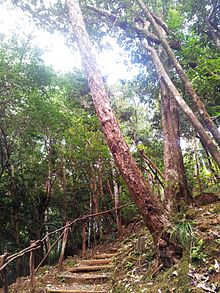Psiloxylon
Appearance
(Redirected from Psiloxylaceae)
You can help expand this article with text translated from the corresponding article in French. (March 2021) Click [show] for important translation instructions.
|
| Psiloxylon | |
|---|---|

| |
| Psiloxylon mauritianum tree growing in Vallée de Ferney reserve, Mauritius. | |
| Scientific classification | |
| Kingdom: | Plantae |
| Clade: | Tracheophytes |
| Clade: | Angiosperms |
| Clade: | Eudicots |
| Clade: | Rosids |
| Order: | Myrtales |
| Family: | Myrtaceae |
| Subfamily: | Psiloxyloideae |
| Tribe: | Psiloxyleae A.J.Scott |
| Genus: | Psiloxylon Thouars ex Tul. |
| Species: | P. mauritianum
|
| Binomial name | |
| Psiloxylon mauritianum | |
| Synonyms | |
|
Fropiera mauritiana Bouton ex Hook. f. | |
Psiloxylon mauritianum (known locally as "bois bigaignon") is a species of flowering plant, the sole species of the genus Psiloxylon. It is endemic to the Mascarene Islands (Mauritius and Réunion) in the Indian Ocean.[1]
It is a white-barked evergreen tree, bearing essential oils. It is dioecious,[1] with male and female flowers on separate individuals. It is traditionally used as a medicinal plant, and appears contain compounds that inhibit the growth of Staphylococcus aureus.[1]
It was formerly placed alone in family Psiloxylaceae, but is now considered a basal member of the family Myrtaceae.[2]
References
[edit]- ^ a b c Sorres, Jonathan; André, Amandine; Elslande, Elsa Van; Stien, Didier; Eparvier, Véronique (2020). "Potent and Non-Cytotoxic Antibacterial Compounds Against Methicillin-Resistant Staphylococcus aureus Isolated from Psiloxylon mauritianum, A Medicinal Plant from Reunion Island". Molecules. 25 (16): 3565. doi:10.3390/molecules25163565. PMC 7465348. PMID 32764510. S2CID 221076087.
- ^ P. G. Wilson; M. M. O'Brien; M. M. Heslewood; C. J. Quinn (2004). "Relationships within Myrtaceae sensu lato based on a matK phylogeny". Plant Systematics and Evolution. 251: 3–19. doi:10.1007/s00606-004-0162-y. S2CID 23470845.
 Media related to Psiloxylon mauritianum at Wikimedia Commons
Media related to Psiloxylon mauritianum at Wikimedia Commons Data related to Psiloxylon at Wikispecies
Data related to Psiloxylon at Wikispecies
